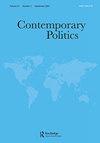How much opposition? Political fragmentation and changes in democracy
IF 2
3区 社会学
Q1 POLITICAL SCIENCE
引用次数: 1
Abstract
ABSTRACT To what extent is political fragmentation associated with changes in democracy? The article uses the European integration process of ten Central and East European democracies to argue that political fragmentation is distinctly related to changes in democracy, depending on whether it is the government or opposition that is fragmented. Moreover, this association is mitigated by EU conditionality in the integration process. The paper tests the argument through the use of time-series cross-sectional data. The findings illustrate the importance of opposition fragmentation as an essential factor in explaining changes in democracy. In conclusion, the article draws attention to the understudied literature on opposition fragmentation by highlighting the theoretical implications of the findings for comparative politics and European integration.有多少人反对?政治分裂和民主变革
政治分裂在多大程度上与民主变革有关?本文以十个中欧和东欧民主国家的欧洲一体化进程为例,论证了政治分裂与民主变革明显相关,这取决于分裂的是政府还是反对派。此外,欧盟在一体化进程中的条件性削弱了这种联系。本文通过使用时间序列横断面数据来验证这一论点。调查结果表明,反对派分裂是解释民主变化的一个重要因素。最后,本文通过强调研究结果对比较政治和欧洲一体化的理论意义,提请人们注意尚未得到充分研究的反对派分裂文献。
本文章由计算机程序翻译,如有差异,请以英文原文为准。
求助全文
约1分钟内获得全文
求助全文

 求助内容:
求助内容: 应助结果提醒方式:
应助结果提醒方式:


